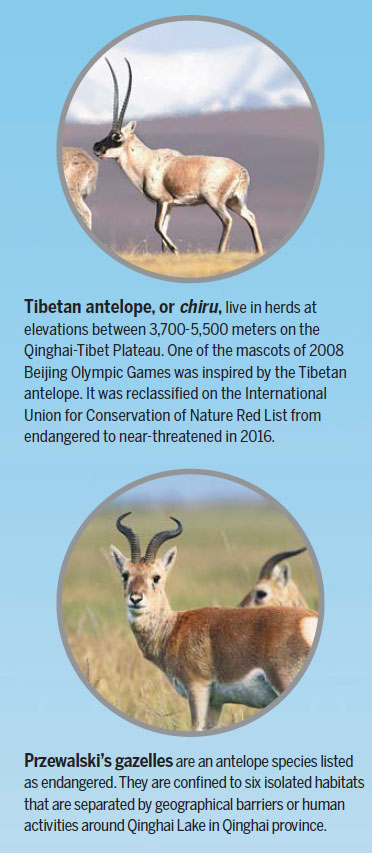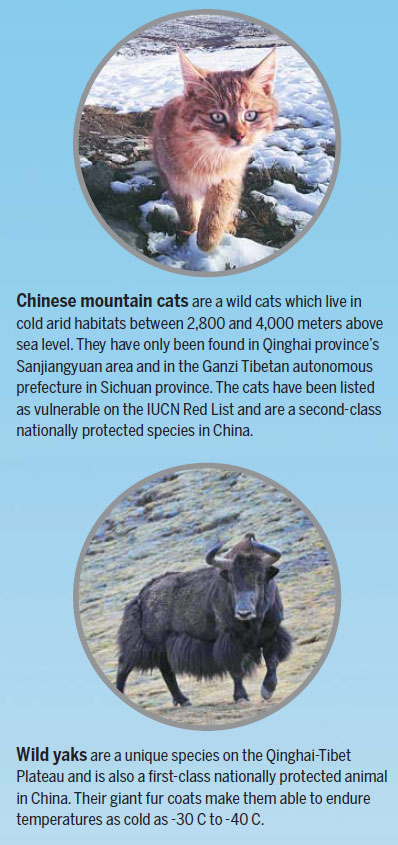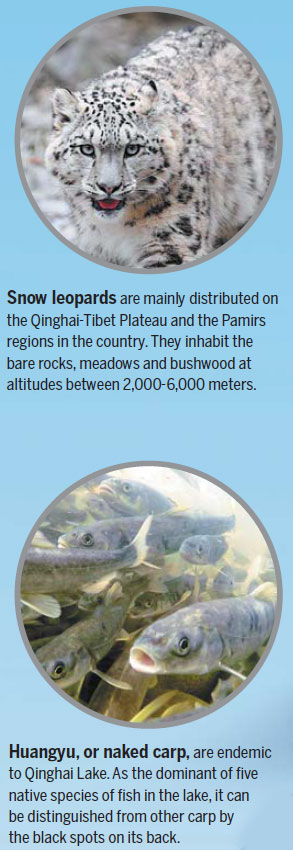Officials making environmental protection a top priority
Qinghai province is forging ahead in its environmental protection efforts.
The province is the birthplace of the major rivers of the Yangtze, the Yellow and the Lancang. It provides nearly 60 billion cubic meters of high-quality water to downstream areas every year, benefiting 20 provinces and regions in China and five other countries.
The unique plateau environment of Qinghai attracts various wildlife including 85 species of wild animals protected at the national level such as the Tibetan antelope and snow leopard.
Qinghai's greatest value, potential and duty lie in ecology, said a top Chinese leader during his visit to Qinghai in August 2016.
To preserve the province's beauty, the Qinghai government has committed to working on two pilot national parks.
Covering more than 123,000 square kilometers, the Three-River-Source National Park is located in Qinghai's Sanjiangyuan area.
Since the 1970s, the area has faced environmental threats from climate change and human activity.
To prevent further deterioration and restore the ecosystem, the central government has carried out two ecological protection projects in the area since 2005.
So far, nearly 100,000 herders in the Sanjiangyuan area have moved out of the grassland. The move has helped reduce the environmental degradation caused by overgrazing.
"I feel relieved when I see from photos that the grasslands in my hometown are flourishing, which proves our efforts were worth it," said Gunga Namgyal, a Tibetan elder who led 406 herders to relocate to a suburb 400 kilometers away from their hometown.
After the park's establishment, to encourage more people to engage in the park's environmental protection, its administrative committee has offered local residents jobs and trained them to be conservationists. To date, 17,211 conservationists work in the park.
Government data show that the environmental protection sector helps Qinghai residents earn an average annual income of around 21,600 yuan ($3,080) per household.
Last year, the grassland coverage in the park increased by 27.31 percent compared to 2017, according to a report released by the park's administrative committee.
As the environment improves, the wildlife population is also on the rise. In 2018, a rare black wolf was photographed for the first time in the park.
Zhao Xiang, director of the Sanjiangyuan project at the Beijing Shanshui Conservation Center, said, "The population of herbivores grew fast and carnivores were frequently sighted in Sanjiangyuan, which is strong evidence of the better ecosystem here."
Another national park pilot undertaken by Qinghai is the Qilian Mountains National Park. Located in the northeastern part of China's Qinghai-Tibet Plateau, the Qilian Mountains National Park covers a total area of 50,200 sq km with 31.5 percent of its area in Qinghai.
The park, featuring rich natural resources and rare wildlife, plays a vital role in protecting biodiversity and maintaining the ecological balance of the Qilian Mountains, said Wang Enguang, deputy director of Qinghai Forestry and Grassland Bureau.
In July, the Qinghai Research Center of the Qilian Mountains National Park was founded in Xining, capital of Qinghai.
Cooperating with universities and research institutes, the center will make efforts to build an advanced monitoring system and protect the local environment with modern technologies.
In addition to the two national pilot parks, Qinghai has always kept a close eye on forest planting.
After 30 years of efforts, Xining's forest coverage rate jumped from 7.2 percent in 1989 to 79 percent in 2018, becoming the only capital city in Northwest China with the dual honors of National Garden City and National Forest City.
Wang Yigui, an official from the National Forestry and Grassland Administration, paid his fifth visit to Qinghai in April.
It is obvious that the desertification area is decreasing and the wetland is expanding, Wang said.
"More importantly, people's ecological and environmental awareness has improved greatly," he added.
To date, a total of 28 counties and districts in Qinghai have abolished the GDP system and replaced it with an assessment mechanism taking into account ecological protection and poverty alleviation.



(China Daily 11/26/2019 page29)














